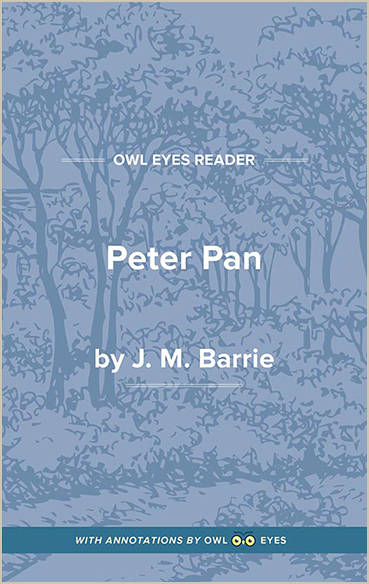Analysis Pages
Vocabulary in Peter Pan
Vocabulary Examples in Peter Pan:
Chapter 1 - Peter Breaks Through
🔒"Of course the Neverlands vary a good deal..." See in text (Chapter 1 - Peter Breaks Through)
"perambulators..." See in text (Chapter 1 - Peter Breaks Through)
Chapter 2 - The Shadow
🔒"breadwinner..." See in text (Chapter 2 - The Shadow)
"MEA CULPA..." See in text (Chapter 2 - The Shadow)
Chapter 5 - The Island Come True
🔒"pluperfect..." See in text (Chapter 5 - The Island Come True)
Chapter 8 - The Mermaids' Lagoon
🔒"bo'sun..." See in text (Chapter 8 - The Mermaids' Lagoon)
"for is it not written in the book of the tribe that there is no path through water to the happy hunting-ground..." See in text (Chapter 8 - The Mermaids' Lagoon)
"Marooners..." See in text (Chapter 8 - The Mermaids' Lagoon)
"cutlass..." See in text (Chapter 8 - The Mermaids' Lagoon)
Chapter 9 - The Never Bird
🔒"perhaps the biggest adventure of all was that they were several hours late for bed..." See in text (Chapter 9 - The Never Bird)
Chapter 10 - The Happy Home
🔒"They called Peter the Great White Father..." See in text (Chapter 10 - The Happy Home)
"but you don't want to [ex]change me, do you?..." See in text (Chapter 10 - The Happy Home)
Chapter 11 - Wendy's Story
🔒"Descendants are only children," said John..." See in text (Chapter 11 - Wendy's Story)
Chapter 12 - The Children Are Carried Off
🔒"perfidious pirates..." See in text (Chapter 12 - The Children Are Carried Off)
Chapter 15 - Hook or Me This Time
🔒"like slaves to a fixed idea..." See in text (Chapter 15 - Hook or Me This Time)
Chapter 16 - The Return Home
🔒"fo'c'sle..." See in text (Chapter 16 - The Return Home)

